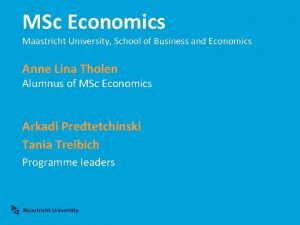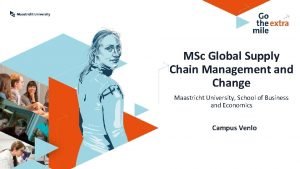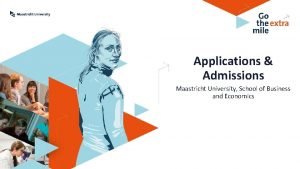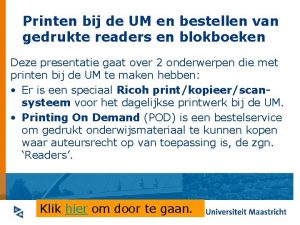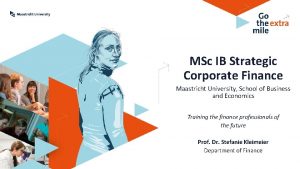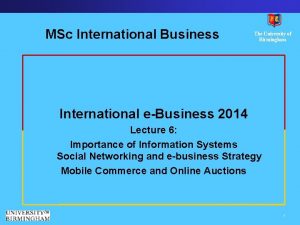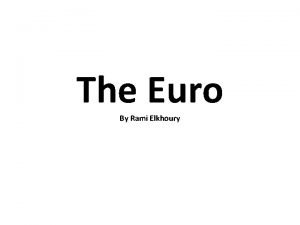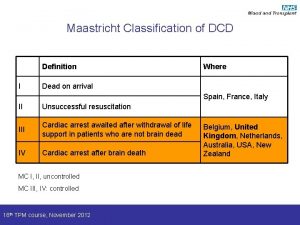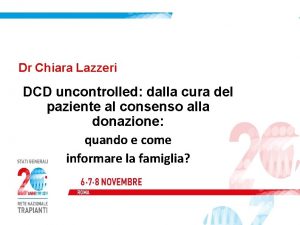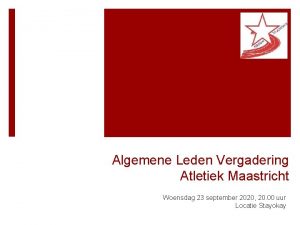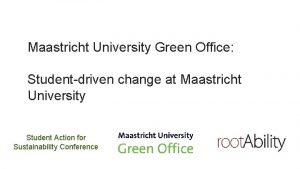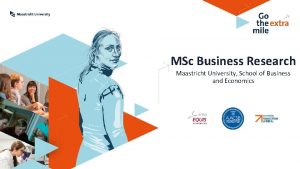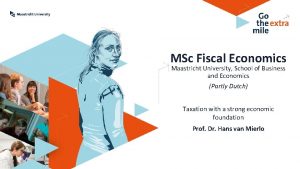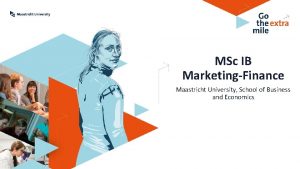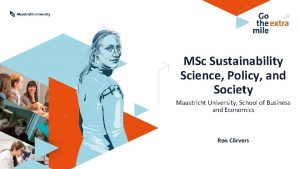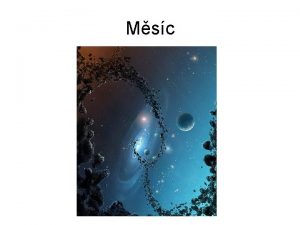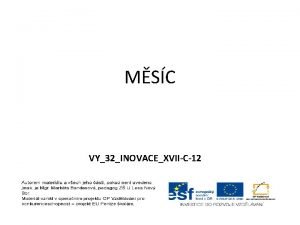Welcome to Maastricht University MSc Neuroeconomics Research Master















- Slides: 15

Welcome to Maastricht University MSc Neuroeconomics Research Master in Cognitive and Clinical Neuroscience

Neuroeconomics seeks to understand explain (puzzling) everyday behavior So many choices. How do we choose? How do we know what a good and a bad choice is? (A hint: this program = good choice)

Neuroeconomics seeks to understand explain (puzzling) everyday behavior • Why are people gambling and taking insurance at the same time? • Why do casinos only talk about the possible gains and insurance companies only about the danger of losses?

Neuroeconomics seeks to understand explain (puzzling) everyday behavior • Why are people tempted to pick the chocolate when they know that they should better pick the fruit? • Why are all sweets in the rack at the cashier in the supermarket?

Neuroeconomics seeks to understand explain (puzzling) everyday behavior • What makes us humans greedy and cooperative at the same time? • Why are bankers paid huge bonuses and is there anything wrong with that?

Neuroeconomics seeks to understand explain (puzzling) everyday behavior How does this all fit together?

Neuroeconomics is an interdisciplinary endeavor Neuroeconomics adds brain to economics. • Neuroeconomics seeks to uncover the neuronal basis of our choices and behavior. Neuroeconomics adds economics to neuroscience. • Neuroeconomics looks at the brain as a system using limited resources.

Tools and methods from economics, neuroscience, and psychology Economics and Game Theory Use the formal language of economics and game theory to model and predict behavior. Economics Experiments Use incentivized experiments without deception to explore behavior. Neuroscience Use methods from neuroscience to measure and explore neural processes underlying observed behavior. Psychology Use insights from psychology (illusions, heuristics, framing effects) to improve models of behavior.

The neuroeconomics curriculum Jointly offered by Faculty of Psychology and Neurpscience (FPN) and School of Business and Economics (SBE). • You will follow courses at both, FPN and SBE. The curriculum: A. Behavior and Mind (at SBE and FPN) B. Neuroscientific Methods (at FPN) C. Research Skills (at FPN and SBE) D. Research (at FPN and SBE)

Behavior and mind Psychology ~ Neuroscience ~ Economics Decision & Equilibrium Theory Game Theory & Information Social Neuroscience Behavioral Economics

Neuroscientific methods Imaging (f. MRI) Electroencephalography (EEG) Magnetoencephalography (MEG) Non-Invasive Brain Stimulation (NIBS)

Research skills Mathematical Research Tools Advanced Statistics MATLAB & Brain Voyager Experimental Economics Methods

Your own research The larger part of the second year is dedicated to research: A. Research Grant Writing B. Research Internship and Master Thesis In Maastricht: Excellent multidisciplinary research groups at Maastricht University – Center of Neuroeconomics (MU-CEN). Abroad: Students have joined research groups at Cal. Tech, Cambridge, MIT, Oxford, WZB-Berlin, Max Planck Institutes, and more. Topics: Range from individual decisions to social human behavior. Methods: Range from behavioral research to f. MRI, TMS, …

Career focus Optimal basis for fundamental and applied research in neuroeconomics and decision sciences: • Ph. D careers at economics, psychology, or neuroscience department (e. g. , University of Oxford, University of Santa Barbara, Max Planck Institute Berlin, …) Excellent preparation for advice in decision making and conflict resolution: • Consultant and advisor at institutions and organizations (e. g. , Internet start-up, Ministry of Education, …).

More information? Questions? • Ask me questions now. • Meet with current students at the Information Market. • Send me an email: m. wibral@maastrichtuniversity. nl • Visit our Research Master website at https: //www. maastrichtuniversity. nl/education/master/researc h-master-cognitive-and-clinical-neuroscience or www. neuroeconomics. nl
 School of business and economics maastricht
School of business and economics maastricht Maastricht university supply chain management
Maastricht university supply chain management Admission maastricht university
Admission maastricht university My um print
My um print Maastricht university ib
Maastricht university ib Faculty of law maastricht
Faculty of law maastricht Msc international business birmingham
Msc international business birmingham Maastricht convergence criteria
Maastricht convergence criteria Paog maastricht
Paog maastricht Dcd maastricht classification
Dcd maastricht classification Kommel maastricht
Kommel maastricht Faculty of law maastricht
Faculty of law maastricht Dcd maastricht classification
Dcd maastricht classification Maastricht
Maastricht Selexyz dominicanen maastricht
Selexyz dominicanen maastricht 23 september maastricht
23 september maastricht
